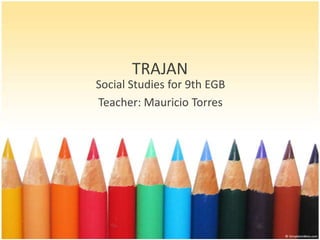
Trajan
- 1. TRAJAN Social Studies for 9th EGB Teacher: Mauricio Torres
- 2. The first non-Roman Emperor • Trajan was born in the year 58 in Hispania, on the outskirts of what is now Seville. • He rose through the ranks of the army, serving in places like Syria and Germany. • Nerva adopted him as his heir, and after his death, Trajan became emperor.
- 3. A True Soldier • It was no surprise that Trajan postponed his visit to Rome, for two years after becoming an Emperor: • He still had unfinished business in Cologne! • He never ceased to be a general: • His presence was commanding, strong features. • Tall and robust, he marched on to Rome by foot with his soldiers with full armament!
- 4. Cleaning Domitian’s Mess • As soon as he arrived to Rome, he set out to fix the undoings of Domitian: • He freed unjustly imprisoned Romans, and returned a great deal of confiscated property. • His popularity was such, that the senate named him: Optimus (the best). • Full name: Imperator Caesar Nerva Traianus Divi Nervae filius Augustus
- 5. Expanding the Empire • As soon as he had himself settled, he set out to conquer what would later be the province of Dacia, rich in gold. This would give the Empire a boost of natural resources. • Here he built his massive bridge across the Danube, an engineering feat, even by today’s standards. • To celebrate his victory over the Dacians, he built Trajan’s Column in Rome.
- 6. Expanding the Empire • Afterwards, he conquered the Nabataean kingdom, along with its famous capital Petra. • In the later years of his life, he defeated Rome’s old enemy: Parthia. With this victory, he claimed Mesopotamia and Persia for Rome; even though, this would not last long. • Rome grew its biggest with Trajan.
- 8. Peace • After he conquered the Nabataean kingdom, there was a short period of peace. • During this time he took to build many works of engineering and architecture: • Roads in Italia and Hispania. • A new Forum and maket (both named after him). • And many triumphal arches.
- 9. Triumphal Arch in Algeria
- 10. Financial Bonanza • With the gold coming from Dacia, plus his policy of devaluating the denarii, he had more money at his disposal. • He hosted also one of the biggest gladiatorial festivals Rome had ever seen: • 5 million spectators • 11 thousand dead!
- 11. Welfare programs • He created a welfare program called Alimenta. • With it, he was able to help orphans and poor children all throughout Italy.
- 12. Death • He died on his way back from Mesopotamia. He was old, tired and ill. • His ashes were buried underneath his columm in Rome.
- 13. Personality • • • • He was known to be fair and just. His courage went beyond stoicism. His mind was clear and direct. Honest, took no advantage of his office nor for his friends. • In short: simplicity, geniality and moderation were synonyms of his name.